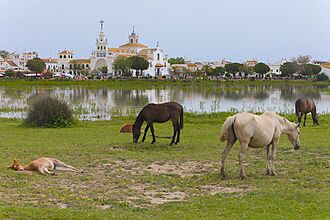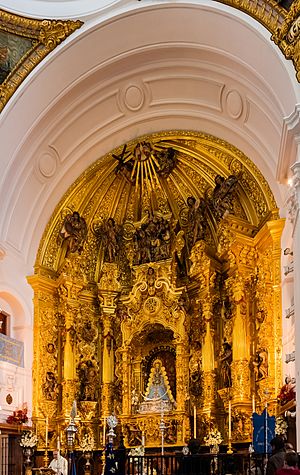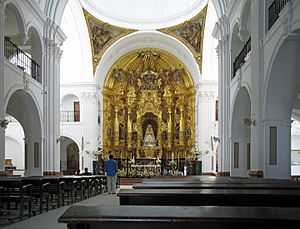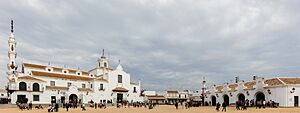Hermitage of El Rocío facts for kids
Quick facts for kids Hermitage of El Rocío |
|
|---|---|
|
Ermita de El Rocío
|
|
 |
|
| Alternative names | Ermita de la Virgen del Rocío Hermitage of the Virgin of El Rocío |
| General information | |
| Type | Hermitage |
| Town or city | Almonte (Province of Huelva) |
| Country | Spain |
| Construction started | 1964 |
| Completed | 1980 |
| Inaugurated | 1969 |
| Design and construction | |
| Architect | Antonio Delgado y Roig and Alberto Balbontín de Orta |
| References | |
| El Nuevo Santuario de la Virgen del Rocío, hermandadrociosevilla.com, retrieved 2010-04-14, for the dates of construction. | |
The Hermitage of El Rocío (called Ermita del Rocío in Spanish) is a special church building. It is located in the countryside of Almonte, in the Province of Huelva, Andalusia, Spain. This hermitage is home to a small, very old wooden statue called the Virgin of El Rocío.
Every year, many people travel to this hermitage for a big event. This event is a procession and pilgrimage called the Romería de El Rocío. It happens on the second day of Pentecost. Millions of people come together for this special journey.
The building you see today was designed by architects Antonio Delgado y Roig and Alberto Balbontín de Orta. They started planning it in 1961. The building was constructed over about two decades.
Contents
History of the Hermitage
The First Hermitage
Old stories say that King Alfonso X of Castile, also known as Alfonso the Wise, visited this area in 1270. He ordered a church building to be built there. It was dedicated to the Virgin Mary. This place was known as Las Rocinas. It had recently been taken back from the Muslims. At that time, Muslims ruled much of southern Spain.
King Alfonso also loved the beauty of the area. He liked that there were many deer there. So, in 1269, he created a hunting preserve. This area is now mostly part of Doñana National Park.
The first Hermitage of El Rocío was a simple building. It was built in a style called Mudéjar. This was sometime after 1270, and definitely before 1300. The statue of Our Lady of El Rocío has been in a building on this site since then.
Changes Over Time
The original hermitage was repaired several times. It had work done in 1612–1614, 1635, and 1658. But in 1755, a very strong earthquake hit Lisbon. This earthquake damaged the hermitage badly, leaving it in ruins.
After the earthquake, the Virgin of El Rocío statue was moved. It stayed in the village of Almonte for two years. During that time, a second hermitage was built. This second building was fixed up in 1919. However, it was taken down in 1963. This was to make space for the hermitage that stands there today.
Building the Current Hermitage
The current Hermitage of El Rocío was designed by two architects. They were Antonio Delgado y Roig and Alberto Balbontín de Orta. They showed their plans in 1961. Their design was chosen on May 24, 1963.
The statue of the Virgin was moved to Almonte on June 16, 1963. This was so the old hermitage could be torn down. Demolition started in July of that year. The first stone of the new building was placed on January 26, 1964. A temporary chapel was built quickly. It was ready for use just 33 days later.
Most of the construction continued until January 10, 1969. There were heavy rains that stopped a planned blessing in March. So, the new hermitage was officially blessed on April 12, 1969.
Even after the blessing, the building was not fully finished. More construction happened until 1980. That's when the cross was placed on top of the building. This cross is very old, dating back to 1692. It used to be in Seville.
A very important visitor came to El Rocío on June 14, 1993. This was Pope John Paul II.
See also
 In Spanish: Ermita de El Rocío para niños
In Spanish: Ermita de El Rocío para niños
 | DeHart Hubbard |
 | Wilma Rudolph |
 | Jesse Owens |
 | Jackie Joyner-Kersee |
 | Major Taylor |




